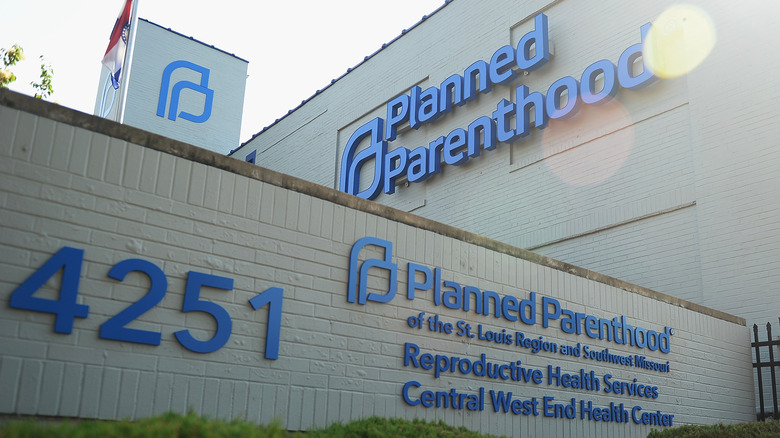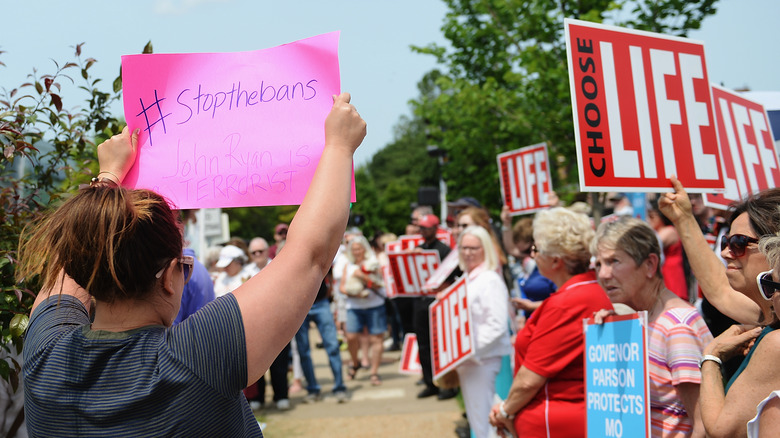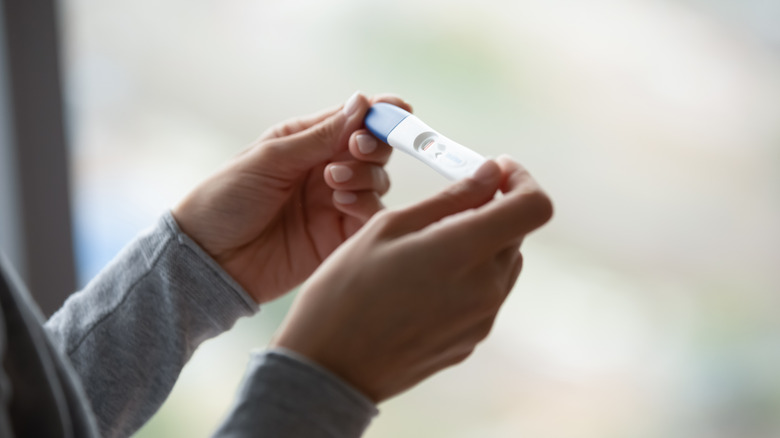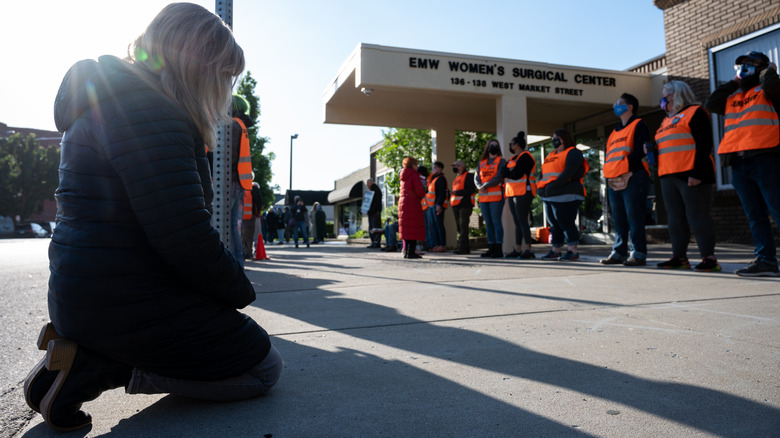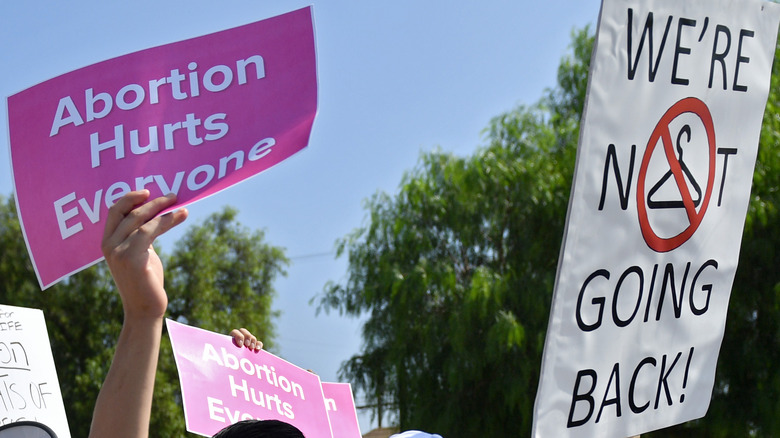How Crisis Pregnancy Centers Are Creeping Up Across The US Due To Supreme Court Abortion Ruling
Every major news outlet seems to have a report about a pregnant person who somehow ended up in a crisis pregnancy center instead of an abortion clinic. The Los Angeles Times, The New York Times, and CNN have all recently published stories that could have been told by the same person. One Texas woman informed the Los Angeles Times she was approached by anti-abortion activists after leaving an appointment at an abortion clinic.
Another woman in the South Bronx — a predominantly Catholic neighborhood — told The New York Times a big sign reading "Free Ultrasound" drew her in. If you Google "abortion near me," there's a high probability the top results are looking to provide you with anything but. Despite Google's new transparency rules for advertising abortion services, separating understanding who can give you the help you need feels harder than ever.
In fact, an analysis of center websites by abortion advocacy group The Alliance found that while crisis pregnancy centers may look like proper establishments, they often don't even have a medical provider on staff. Going to an abortion clinic in person isn't any less confusing; CNN found that "more than 100 pregnancy centers" in the United States are "located within 200 meters of an abortion clinic or Planned Parenthood location."
In some cases, these centers pop up right next door to clinics. And, as The New York Times explains, their sole purpose is to convince a pregnant person not to have an abortion.
Crisis pregnancy centers outnumber abortion clinics
Even before the Dobbs v. Jackson Health Organization decision back in June, pregnancy crisis centers — run by anti-abortion groups — have been steadily on the rise. Even in more liberal states like New York, where The New York Times reports new protections have gone into place for abortion and abortion providers, crisis pregnancy centers outnumber abortion clinics in a clear sign of the ongoing underestimation of the anti-abortion movement.
According to research done by the Charlotte Lozier Institute, an anti-abortion research group, there are currently around 3,000 crisis pregnancy centers in operation in the US. The Institute also found these centers outnumber abortion clinics considerably, a gap that Axios points out is only expected to widen.
Since the Dobbs decision, these crisis centers have not only been increasing, U.S. News & World Report reports they are also getting more funding and support — especially from conservative state leaders. For Dean Nelson, vice president of government relations for Human Coalition, a national anti-abortion group, this is "an opportunity like never before" to promote the movement's damaging agenda.
But, according to Amy Reed-Sandoval, a UNLV Department of Philosophy assistant professor, most of these crisis pregnancy centers end up simply being another barrier someone has to break through in order to get medical care (via Nevada Current). Surprising no one, Texas — whose new abortion ban only recently went into effect — has more crisis pregnancy centers than any other state, their numbers totaling around 200, per the Los Angeles Times.
Crisis pregnancy centers aren't bound by patient confidentiality laws
According to Time, crisis pregnancy centers got their start in the '60s and were originally run by Catholic groups looking to prevent abortions by offering counseling and other social services instead. With the birth of the "pregnancy help movement" following the landmark Roe v. Wade decision in 1973, religious activists helped to expand the centers' reach and purpose.
This included planning conferences and training, organizing centers into networks, and coming up with "legislative strategies." Centers have opened consistently across the United States ever since, but their services differ depending on location. A study published by the Charlotte Lozier Institute found that the majority of staff aren't even healthcare professionals.
Locations that have medically-trained employees, meanwhile, tend to offer free pregnancy tests and ultrasounds to lure people in, per The Guttmacher Institute. According to the Associated Press, one thing all crisis pregnancy centers have in common is that they aren't licensed healthcare providers. So, while certain outlets may offer medical services, any information collected — including personal data like sexual and reproductive histories — is not protected by federal privacy laws.
As privacy experts told Time; this is why crisis centers help clients not patients. In states like Texas, where civilians can sue people who get abortions and abortion providers, centers can hand over information that could later be used as evidence against the pregnant person. States like Texas also help fund pregnancy crisis centers, often using taxpayer money to do so.
States are using taxpayer money to fund anti-abortion centers
Everything is bigger in Texas, including how much taxpayer money is used to help fund pregnancy crisis centers. According to the Associated Press, Texas created its own anti-abortion program in 2005 using $5 million of federal funding. Recently, Texas lawmakers dedicated a further $100 million in funding over the coming two years for "programs offering abortion alternatives."
They're not alone; a new report by CNN found 18 states using taxpayer money to fund pregnancy crisis centers, with at least six drawing from Temporary Assistance to Needy Families (TANF), a federal welfare program whose funds state officials are given a "wide latitude" on how they disperse. Ohio, for instance, has given over $528,000 to the Pregnancy Decision Health Center, a crisis pregnancy center, which equates to a quarter of their revenue.
A 2017 report from Pennsylvania, however, found that Real Alternatives, an anti-abortion group that handles the distribution of funding to pregnancy centers, used "hundreds of thousands of ... taxpayer dollars to fund its activities in other states." Real Alternatives claimed the allegations are false.
Elsewhere, Texas and Tennessee both have programs to connect pregnant people with resources before and after they give birth. The AP reports that by 2020 Tennessee's "abortion-alternative contractors" had "provided roughly 1 million goods such as diapers and food, gave 331,000 counseling sessions, taught 314,000 parenting classes, made 217,800 referrals to government assistance programs, and provided 56 adoption services."
Crisis pregnancy centers pose huge public health risks
Despite the good pregnancy crisis centers arguably provide, the public health risks they create through misinformation alone are deeply troubling to lawmakers and healthcare providers alike. According to a 2006 report prepared for Rep. Henry Waxman (D-CA), crisis pregnancy centers "provided false or misleading information" to potential clients, which often delayed and interfered with their access to abortion or other contraceptive services.
More recently, a study published by The Alliance found: "Almost two-thirds (63%) of CPCs promoted patently false and/or biased medical claims, mostly centered on pregnancy, contraception, and abortion, especially medication abortion." Included was damaging information about abortion pill reversal — an "unproven and unethical" procedure the Ohio-based Pregnancy Decision Health Center advertises they offer.
CNN reports there has only been one study conducted thus far on the so-called reversal, but it ended once patients started "hemorrhaging." Ayla Krueger visited PDHC with a friend who wanted an STD test. According to Krueger, a PDHC employee told them "condoms were only 50% effective" and that if they got an abortion while they had an STD, "your STDs [will] travel up your cervix into your organs and could kill you."
Andrea Swartzendruber, a University of Georgia public health professor who has helped map the location of crisis pregnancy centers nationwide, told the Associated Press that centers also make claims linking abortion with mental health problems and even breast cancer later in life — which is scientifically not true.
Other abortion myths crisis pregnancy centers perpetuate
An early report found a possible link between terminated pregnancies and abortion, but a comprehensive study by the National Cancer Institute, in 2003, and subsequent studies since found no link between abortion and breast cancer, per the Guttmacher Institute. Furthermore, a 2018 National Academies of Engineering and Medicine review of studies claiming to find such evidence confirmed they failed to "meet scientific standards for rigorous, unbiased research."
Their review also concluded abortions did not increase the risk of "secondary infertility, pregnancy-related hypertension disorders, abnormal placentation, preterm birth, breast cancer, or mental health disorders." Elsewhere, Julia Steinberg, an associate professor of family science at the University of Maryland's School of Public Health, told CNN: "There are states in which women are told that because they're having an abortion, they're at increased risk for depression, suicidal ideation, post traumatic stress disorder and more."
The Guttmacher Institute adds they found two crisis centers in New York that advised on their website that since there's a chance of miscarriage, abortion isn't necessary, failing to explain the risk decreases as pregnancies progress. Contraceptives are not off-limits, either. As Lillian Williams, the vice president of health services of Planned Parenthood of Greater Ohio, informed CNN simply: "They've provided an array of misinformation, whether it's about abortion care or even about contraceptive services." The CDC clarifies that, as with everything else, such claims are false.

